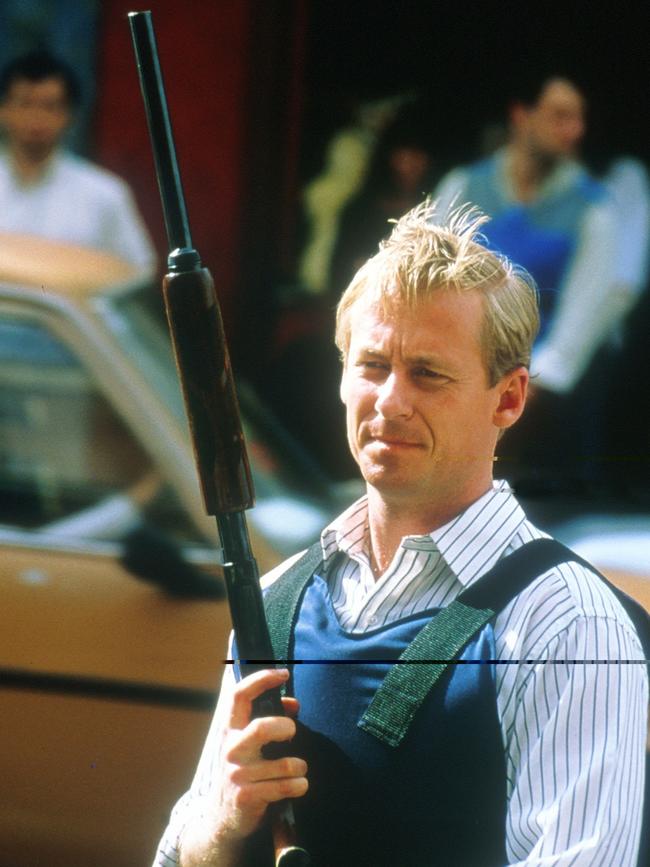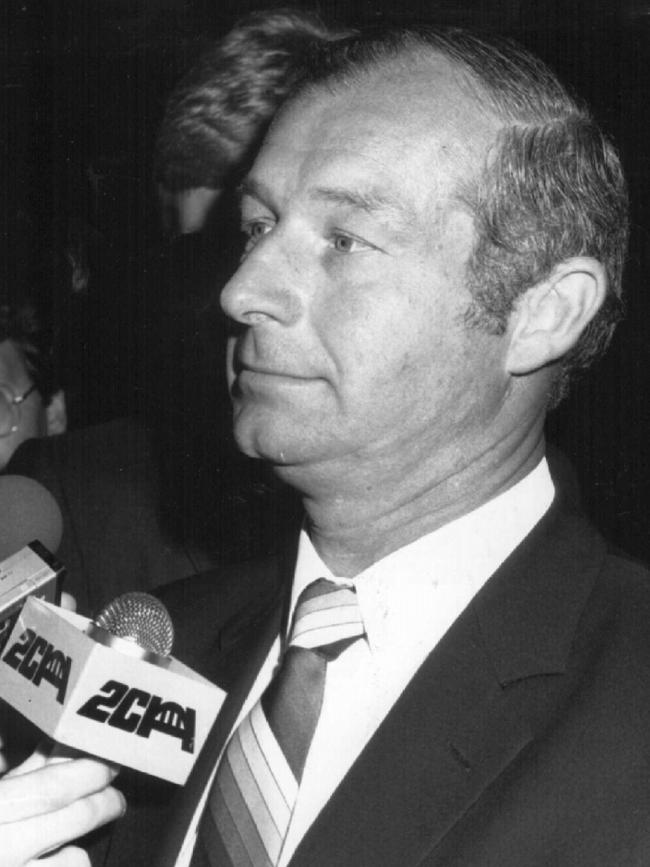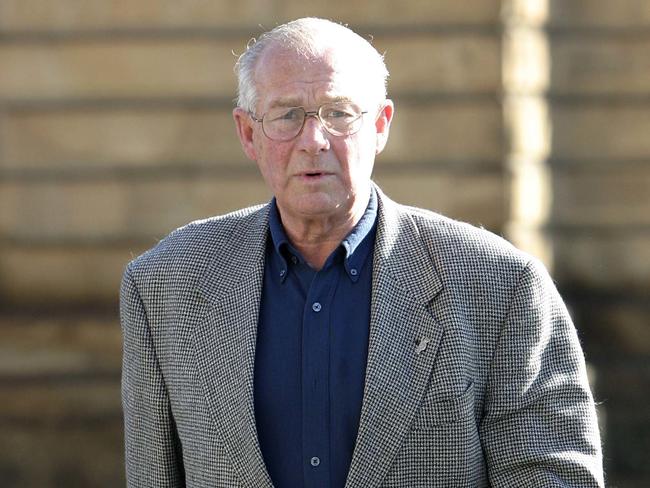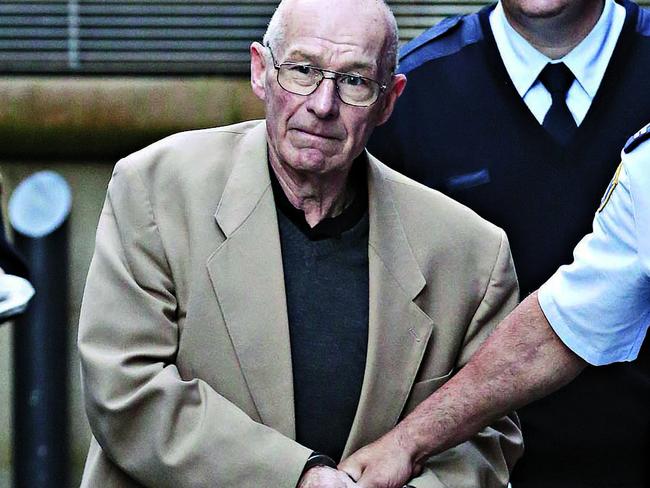Andrew Rule: How crooked cop Roger Rogerson fell from Dirty Harry to Dad’s Army
When Roger Rogerson turned up at the dressing room door of sultry Welsh singer Shirley Bassey, for once he didn’t have a gun in his pocket. But he did have her stolen handbag.
Andrew Rule
Don't miss out on the headlines from Andrew Rule. Followed categories will be added to My News.
Even Beethoven had his critics, as Chopper Read once noted. And so did Roger Rogerson — but Dame Shirley Bassey wasn’t one of them. The sultry Welsh singer famed for sexy Bond film theme songs was delighted when the dashing detective turned up at her dressing room door after one of her many Sydney performances.
For once, Rogerson didn’t have a gun in his pocket. But he did have Miss Bassey’s handbag, which had gone missing earlier that day. Rogerson just happened to grab a thief with the bag and, having identified its owner, decided the personal touch was required.
“Roger the Dodger” liked to make new friends, especially influential ones. A gentleman never tells, but Rogerson mentioned much later that every time the esteemed singer visited Sydney after that, he and she got together.
It must have been a very valued handbag.
By the time I first met Rogerson in early 2006, he had served three years in jail and had not been a policeman for 20.
His Shirley Bassey era was well behind him but he still had the powerful personality that had driven his rise and his fall — and which had made him the face of Sydney corruption when Richard Roxburgh played his character in the semi-factual drama series Blue Murder.
He insisted on picking me up from the nearest railway station to his home in Sydney’s west to save me the taxi fare.


Years earlier, a Queen’s Counsel had reduced a packed court to laughter by quipping “If Roger Rogerson was directing the traffic, I wouldn’t leave the kerb.”
Yet here I was hitching a ride with the country’s most notorious rogue policeman — which is not to say he was the most evil of them, given what the Fitzgerald Inquiry revealed about the Queensland police “Rat Pack”.
Compared with the likes of Sir Terry Lewis in Brisbane and some of his own bent superiors, Rogerson hadn’t siphoned life-altering fortunes from the dark side. A few hundred thousand, for sure. Maybe enough to bankroll another house or a flash boat under a patsy’s name. Except that he’d hit a huge hurdle and had to bankroll expensive defence lawyers instead.
For somebody who well knew the wisdom of “staying out of court and out of hospital,” he had managed to avoid neither.
Between criminal charges and injuries, Sydney’s prince of policemen in the colourful Neville Wran era lost his mojo just before Wran lost his.
And so, by 2006, it had come to this — a neat house in a neat street in Padstow Heights where he lived with his second wife, Anne Melocco. Pleasant and comfortable, hardly luxurious. It had a backyard pool but so did thousands of other suburban homes. In the garage was a well-kept Jaguar, a 25-year-old model that Anne had bought from a workmate for $9000 nine years earlier.
Not that Rogerson used the Jag much. His soft spot for “prestige” British cars was likely a hangover from his origins as the oldest son of a battling Yorkshire shipyard worker and Welsh mother who’d married in Sydney.
When Rogerson collected me from the station, he was driving a decrepit Falcon wagon, the sort of tired banger that handymen and painters used for work.

Until the world turned on him in the mid-1980s, Rogerson was seen as some sort of “Dirty Harry” Callahan figure, a shoot-first cop playing by his own rules. But then he’d been isolated by an honest “new broom” commissioner, John Avery, and dismissed and prosecuted for perverting the course of justice and lying under oath.
So, in 2006 the man at the wheel of the old wagon was no Clint Eastwood, let alone the dashing, dangerous and devious character that Richard Roxburgh had played in the brilliant drama that shackled Rogerson forever to the rogue cop image.
He had always been on the small side for a policeman, and age and injury had shrunk and bent him.
One of his shoulders was lower than the other — the result, he said, of falling from a high roof while helping a friend demolish a shed. Rogerson was many things but he wasn’t afraid of hard work or risk.
His left arm was so useless he couldn’t change gear with it. He walked with a bow-legged limp like a pirate with a wooden leg — which figures, as his mother Mabel claimed descent from the Welsh-born Caribbean buccaneer Sir Henry Morgan, who plundered the high seas in the 1600s.
Rogerson and his wife kept three small terrier-cross dogs, the smallest of them as battered and as lame as he was. The nearest the old rogue came to expressing genuine emotion that day was when he spoke of the little dog almost dying while he (Rogerson) had been in prison.
The rest of the time, he was determinedly bright and breezy, spinning a well-polished routine starring himself as the old-school cop in “the best police force money could buy” persecuted by hypocrites and opportunists who played the anti-corruption card to score praise and promotion under a “cleanskin” commissioner.

He mentioned Blue Murder and rolled out the line about Anne watching it with him and saying (of the Richard Roxburgh character) “I didn’t realise you were so good looking when you were young.” Boom boom.
Only occasionally did his underlying bitterness break through the jokey veneer of pride and prejudice. This was the man who’d once been compared with the young Don Bradman: gimlet-eyed, ruthlessly competitive and intelligent enough to be thought of as a future police commissioner. But times changed and Rogerson didn’t.
As the World War II generation of senior police, many of them heroically corrupt returned servicemen, slipped quietly into the anonymous safety of retirement, Rogerson had kept too many fingers in too many pies.
“Good Roger” had won 13 awards for bravery and diligence, although one award was linked to a controversial shooting. That was his alleged execution of drug dealer Warren Lanfranchi in Sydney in 1981, followed years later by the drowning murder of Lanfranchi’s whistleblower girlfriend Sallie-Anne Huckstepp.
“Bad Roger” had been the middle man between operational cops and the old guard of corrupt senior officers and “colourful identities” like nightclub king Abe “Mr Sin” Saffron and race-fixing gangster George Freeman.
He genuinely admired his old CIB boss, Noel Morey, who had faked his age in 1942 to join the armed forces at 17 to fight the Japanese in Borneo. Likewise another allegedly corrupt senior officer who had been a wartime tail gunner.
When Royal Commission investigators visited Rogerson in prison in 1994 and offered him immediate freedom in a secret deal to give evidence against Morey and several others, he calmly took the written offer and tore it to pieces.

That act of defiance guaranteed him another 18 months in a cell. But he had the perverse pleasure of knowing that the unhappy investigators faced returning to the Wood Royal Commission with the perplexing news that Australia’s most famously bent cop could not be bought.
Rogerson told me indignantly that the people they wanted him to “give up” were great Australians, giants compared with the meek salarymen sent to investigate the backlog of crime and corruption that had flourished under at least two state governments — Sir Robert “Slippery Sam” Askin’s Liberals and “Nifty” Neville Wran’s slick Labor equivalent.
The Askin and Wran eras together spanned the years from 1965 to 1986, a golden era for organised crime that saw SP bookies and illegal casinos and brothels infiltrated by a new breed of drug traffickers.
Rogerson and other equally ruthless rogues had learned the entrenched police and political corruption from the old timers but swiftly made the switch to milking the drug trade at every level.
This was the era when Premier Wran coolly appointed a degenerate gambler, Rex Jackson, as Corrections Minister — a position Jackson exploited by selling early prison release to any crim who’d pay cash.
In the end, Jackson was prosecuted and jailed for taking bribes from three Broken Hill marijuana growers. Strangely, or perhaps not, the Wran Government’s tame police, prosecutors and judiciary failed to nail any more “early release” charges despite the fact that several hundred other prisoners also bought their way out of jail.
Against this background of systemic corruption, Rogerson felt hard done by. Trapped by the backhanded “success” of his portrayal in Blue Murder after doing jail time, he’d become the whipping boy for a generation of bent cops and politicians.
The brilliant detective of the 1970s never lost his murderous edge. But he did get old, slow, desperate and lazy. There can be no other explanation for the half-baked and cold-blooded “plan” to abduct, rob and kill young drug dealer Jamie Gao in 2014.
Rogerson and co-accused, former policeman Glen McNamara, did not realise they were automatically being filmed moving Gao’s body in a surf board bag at a Padstow storage unit.
The evidence against the Dad’s Army hitmen was damning even before Gao’s body was found floating off Cronulla some days later. Apart from everything else, they had failed to weigh down the body properly, using rope instead of chain. Their life convictions were inevitable and just.
There will always be unanswered questions about Rogerson. One of them is this: did he send a pet thief to pinch Shirley Bassey’s handbag to set himself up as a white knight?
You wouldn’t put it past him.




